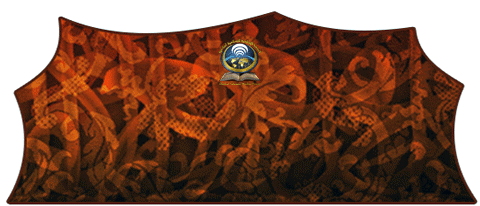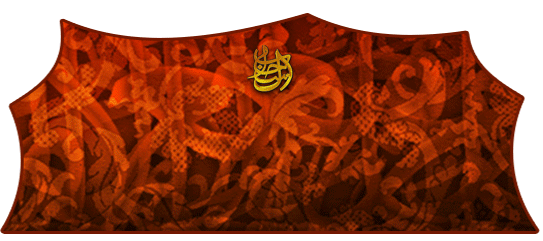
Click the following link for a safe PDF copy: Dr. Ayman al-Ẓawāhirī — “Answers to the Esteemed Shaykhs”
___________
To inquire about a translation for this release for a fee email: [email protected]
Category: Dr. Ayman Al-Zawahiri
New statement from ‘Ā’ishah Media Center: “Call To the Wise of the Ummah Shaykh Ayman al-Ẓawāhirī"

Click the following link for a safe PDF copy: ‘Ā’ishah Media Center — “Call To the Wise of the Ummah Shaykh Ayman al-Ẓawāhirī”
_________
To inquire about a translation for this statement for a fee email: [email protected]
al-Batār Media Foundation presents a new article from Abū Khabāb al ‘Irāqī: "Testimony To Preserve the Blood, Between Hope and Pain"

Click the following link for a safe PDF copy: Abū Khabāb al ‘Irāqī — “Testimony To Preserve the Blood, Between Hope and Pain”
_________
To inquire about a translation for this article for a fee email: [email protected]
New article from Dr. Iyād Qunaybī: "Ten Points On 'Testimony To Preserve the Blood of the Mujāhidīn in al-Shām'"
بسم الله والحمد لله والصلاة والسلام على رسول الله.
1. كلمة الدكتور الظواهري حفظه الله (شهادة لحقن دماء المجاهدين بالشام) هي ما انتظره المتابعون لأمر الجهاد الشامي منذ عام لفهم ما يجري. ويبدو أن تأخر الدكتور في إصدارها كان سببه الحرص على حل المشكلة داخليا دون بيان أخطاء جماعة الدولة.
2. د. أيمن رجل شديد الأدب مع المسلمين عموما، وهذا من أخلاق المجاهدين. ومع أن فرع تنظيمه في العراق لم يخطره ولا الشيخ أسامة بإعلان دولة، ولا استشار في تولية البغدادي، ولا في إعلان “تمدد الدولة”، ومع أن ناطق جماعة الدولة وصف منهج الدكتور بالانحراف، إلا أن د. أيمن عاد بعد حدته إلى لين الخطاب مع البغدادي (نسأل الله أن يهديه) وخاطبه بالشيخ المكرم الحسيني، رجاء أن يؤوب إلى ما فيه فلاح المسلمين.
3. ولا ينبغي مؤاخذة د. أيمن بأنه بلين خطابه هذا قد هوَّن مما فعلته جماعة الدولة. بل بين في كلمته أنها شقت الصف وتسببت في نفع النظام النصيري وأسالت دماء المسلمين. ورفض فرضها لــ “دولة” على الناس وعلى الفصائل الأخرى وبين أن من أسباب عدم مشروعية “تمددها” أنه لم يكن بمشورة مع هذه الجماعات. فرفقا بالشيخ أيها الناس، فهو لا يستهين بحقوق المسلمين، بل يترفق بالحديث من باب طرق جميع الأساليب لحقن الدماء بعدما أغلظ لهم الخطاب من قبل.
4. لكن هناك أمراً توقع البعض أن يكون أوضح في الكلمة. فمطالبة أبي بكر البغدادي بالرجوع إلى العراق –هداه الله للاستجابة لذلك- لا بد أن تكون مقرونة بالتأكيد على تغيير جذري في طريقة تعامل الجماعة. ولعل الدكتور أشار إلى ذلك بتأكيداته على أن المطلوب هو عودتها لمواجهة أعداء أهل السنة في العراق. وإلا فلا يمكن تناسي شكاوى الفصائل المجاهدة في العراق كأنصار الإسلام من سلوك جماعة “الدولة” ورسائلهم التي نشروها مبينين فيها بالأسماء والوقائع حصول اعتداءات وقتل من جماعة الدولة في حق أمرائها وطلاب علمها، ومطالبين الدكتور أيمن بالتدخل لوقفها، وهي ذات شكاوى جيش المجاهدين في كتابه: (الدولة الإسلامية بين الحقيقة والوهم)، والذي نشره ردا على وصف العدناني لهم بالصحوات.
وإنا لنخشى أن يكون ما يعانيه المشروع الجهادي والقيادة في خراسان الآن من جماعة “الدولة” وعصيانها لها وتجرؤها عليها، نخشى أن يكون ذلك دفعا لثمن تأخرها في إنصاف هذه الجماعات، واستمرارها في الثناء على جماعة “الدولة” علنا على ما تلبست به من مظالم من قبل في حق الناس. ولعل القيادة كانت تناصح الجماعة في السر وتضغط عليها لترد المظالم، والله أعلم.
لكن لعل التوازن كان يقتضي ألا يمنع الاعتراف بالجانب المشرق من جماعة “الدولة” وتحريرها للسجناء ومواجهتها للمحتل وأذنابه، ألا يمنع ذلك من استنكار المظالم والتبرؤ منها بحزم، والإلزام برد الحقوق إلى أهلها.
لعل سُنة (اللهم إني أبرأ إليك مما صنع خالد) كانت تقتضي ألا يمنع خوف إعطاء ذريعة للإعلام وأعداء الإسلام من الانتقاد العلني للأخطاء، تنزيها للشريعة والجهاد، وخوفا أن ينفر الناس عن دينهم.
5. للسبب نفسه فلعل الناس كانوا يتوقعون من الدكتور حفظه الله أن يُلزم البغدادي بالخضوع للتحكيم الشرعي فيما يُنسب إليه من مظالم مهما صدر من حكم له أو عليه فيها، قبل مطالبته بالعودة جنديا في صفوف أميره، وقبل التأكيد له بأن اتخاذ قرار الانحياز للعراق سيجعل (إخوانِك المجاهدين وكل أنصارِ الجهادِ أعوانًا لك وسندًا ومددًا). لئلا يُفهم من الخطاب إسقاط هذه الحقوق والمظالم أو عدم العناية بها، وهو ما لم يعنِه حفظه الله يقينا.
6. خاطب الدكتور البغداديَّ بالشيخ المكرم الحسيني، وهي عبارات مُشعرة بالعدالة المؤهلة لإمارة جماعةٍ مجاهدة. لن نناقش هنا بقاء هذه العدالة أو سقوطها بما وقع من الجماعة في ساحة الشام. بل السؤال الذي يطرح نفسه بإلحاح هنا: هل يعلم الدكتور أن قيادة جماعة “الدولة” كانت ابتداء مستحقة لهذا التكريم؟
نتفهم تماما رغبة الدكتور حفظه الله في حقن الدماء ونتمناه كما يتمناه، لكننا هنا أمام أناس يتخذون ثناءه هذا سببا لإضفاء الشرعية على “دولة” البغدادي على أنها دولة استوفى أميرها شروط اعتباره (أميراً للمؤمنين)!
وضح الدكتور أن القيادة في خراسان طلبت نبذة عن البغدادي ونائبه وأنهما غير معروفين لدى القيادة. فمن حق الأمة أن تعلم: بماذا جاء الرد؟ هل تبين للقيادة عدالة البغدادي ومن حوله وتَأَهُّلهم علميا لقيادة جماعة تجاهد جهادا رشيدا، فضلا عن التأهل لقيادة دولة؟ فضلا عن ادعاء إمارة المؤمنين؟!
هذا سؤال انتظر كثيرون الإجابة عنه من د. أيمن، ومن زمن طويل: من يعرف البغدادي وقياداته؟ ومن زكاهم؟
7. أثبت خطاب الدكتور أن البغدادي كان جنديا عنده. فإن كنا نتحدث عن دولة أميرها هو نفسه جندي ومأمور في نفس الوقت، ودولته جزء من تنظيمٍ وتابعة له، فمعنى هذا أن هذه الدولة ليست دولة يجب لأميرها الطاعة ولا البيعة، وإنما هو أمير خاص لجزء من جماعة، يقالُ ويعيَّنُ من غير أن يكون له أن يتأمر على غيرِ مَن عُين أميرا عليهم! فالتمدد بعد ذلك قهر وتسلط غير مشروع.
فادعاء البغدادي للإمامة العامة ثم ادعاء حق التمدد بناء عليه كان إذن تشبعا منه بما لم يُعط. و ((المتشبع بما لم يعط كلابس ثوبي زور)). فكيف يدعي لنفسه ذلك وهو جندي مأمور؟! ولماذا إذن حاولت جماعة “الدولة” خلال الفترة الماضية التنصل من الاعتراف بتبعيتها للظواهري إلى أن أثبتها الدكتور بنفسه؟ ألا تعلم الجماعة أن هذه التبعية تحرمها حق الإمامة العامة؟ ثم ألا يكون هذا السلوك من مراوغة عن الحقيقة وادعاء ما ليس بحق لها واضعا لعدالة أميرها محل تساؤل؟
8. لأسباب نشرحها لاحقا بإذن الله، لا نعتقد أن ما قام في العراق أصلا كان يصح أن يُسمى دولة. ولو صح، فإن هذه الدولة قد زال “تمكينها” فكان لها في تحرير نفسها من الاحتلال، وفي تحرير 4500 أسيرة من “رعاياها” في سجون النظام العميل شغلٌ عن “التمدد” لمناطق أخرى لتحررها من المجاهدين!!
وليس كلامي هذا استهانة بالجانب المشرق من جهد الجماعة في العراق. إنما نقول: لا يصح اعتبارها دولة لأسباب كثيرة جدا، أحدها غياب المشورة.
ذكر الدكتور حفظه الله أنه–بعد إعلان الدولة دون مشورة القيادة- جاءتهم تطمينات بحصول شورى موسعة بين الجماعات المجاهدة في العراق قبل إعلانها. والسؤالان الملحان هنا:
أ) إن كانت الجماعة تتعامل مع قيادتها العامة في كل أمر مفصلي من إعلان دولة وتعيين أمير جديد ثم إعلان “تمدد” بهذه الطريقة، دون استئذان ولا مشورة، وإنما –في أحسن الأحوال- إخطارٌ بعد الوضع تحت الأمر الواقع، فكيف يُتصور أنها أخذت
New article from Shaykh Abū Basīr al-Ṭarṭūsī: "Stance On the Words of Shaykh Ayman al-Ẓawāhirī 'Testimony To Preserve the Blood of the Mujāhidīn in al-Shām'"

Click the following link for a safe PDF copy: Shaykh Abū Basīr al-Ṭarṭūsī — “Stance On the Words of Shaykh Ayman al-Ẓawāhirī ‘Testimony To Preserve the Blood of the Mujāhidīn in al-Shām'”
__________
To inquire about a translation for this article for a fee email: [email protected]
As-Saḥāb Media presents a new release from al-Qā’idah’s Dr. Ayman al-Ẓawāhirī: "Testimony To Preserve the Blood of the Mujāhidīn in al-Shām"
UPDATE 6/11/14 10:54 PM: Here is an English translation of the below Arabic statement:
Click the following link for a safe PDF copy: Dr. Ayman al-Ẓawāhirī — “Testimony To Preserve the Blood of the Mujāhidīn in al-Shām” (En)
_________
—

Click the following link for a safe PDF copy: Dr. Ayman al-Ẓawāhirī — “Testimony To Preserve the Blood of the Mujāhidīn in al-Shām”
__________
To inquire about a translation for this release for a fee email: [email protected]
As-Saḥāb Media presents a new video message from al-Qā’idah’s Dr. Ayman al-Ẓawāhirī: "The Seventh Interview: The Reality Between Pain and Hope"

Part 1:
Part 2:
_________
To inquire about a translation for this video message for a fee email: [email protected]
As-Saḥāb Media presents a new video message from Dr. Ayman al-Ẓawāhirī: “Days With The Imām #4"
UPDATE 6/21/14 11:56 PM: Here is an English translation of the below Arabic video message and transcription:

Click the following link for a safe PDF copy: Dr. Ayman al-Ẓawāhirī — “Days With The Imām #4″ (En)
__________
—
UPDATE 6/15/14 2:22 PM: Here is an Arabic transcription of the below video message:
Click the following link for a safe PDF copy: Dr. Ayman al-Ẓawāhirī — “Days With The Imām #4″ (Ar)
__________
—
NOTE: Click here for previous parts in this series: #3, #2, and #1.
—

___________
al-Batār Media Foundation presents a new article from Abū Sa'd al-Najdī: "Opening of the Exalted Great King In Providing the Truth Upon the Opinions of the Men (Reply To Shaykh al-Ẓawāhirī)"
Click the following link for a safe PDF copy: Abū Sa’d al-Najdī — “Opening of the Exalted Great King In Providing the Truth Upon the Opinions of the Men (Reply To Shaykh al-Ẓawāhirī)”
___________
To inquire about a translation for this article for a fee email: [email protected]
GUEST POST: Ayman al-Zawahiri on Jihadist Infighting and the Islamic State of Iraq and al-Sham
NOTE: As with all guest posts, the opinions expressed below are those of the guest author and they do not necessarily represent the views of this blogs administrator and does not at all represent his employer at the Washington Institute for Near East Policy.
Jihadology.net aims to not only provide primary sources for researchers and occasional analysis of them, but also to allow other young and upcoming students as well as established academics or policy wonks to contribute original analysis on issues related to jihadism. If you would like to contribute a piece, please email your idea/post to azelin [at] jihadology [dot] net.
Click here to see an archive of all guest posts.
–
Ayman al-Zawahiri on Jihadist Infighting and the Islamic State of Iraq and al-Sham
By Daveed Gartenstein-Ross
On April 18, a jihadist social media user tweeted links to two parts of an Al-Sahab Establishment for Media Production interview with al-Qaeda emir Ayman al-Zawahiri. Entitled “Reality Between Pain and Hope,” the interview’s first part was 54 minutes and 15 seconds, while the second part was 28 minutes and 45 seconds. Since the interview was first posted by a social media user rather than Al-Sahab, this appears to be a leak, similar to the recent leak of an unpublished Adam Gadahn video criticizing the Islamic State of Iraq and al-Sham (ISIS) following the death of al-Qaeda emissary Abu Khalid al-Suri.
Given analysts’ focus on recent jihadist infighting in Syria, it is worth noting Zawahiri’s comments on the matter, and on ISIS more broadly. ISIS was, of course, famously expelled from al-Qaeda in a pronouncement that the jihadist group issued in early February.
Zawahiri on Jihadist Infighting
In the interview, Zawahiri is asked about infighting among jihadist groups in Syria. His response is thunderous yet non-specific about which individuals or factions are responsible for the problems. Zawahiri blames the infighting on “the control of whims, ignorance, and injustice over some people,” and further suggests that jihadist factions in Syria may have been infiltrated, perhaps by intelligence services or else just by “misguided advice” and “bad incitement among the mujahedin.”
Asked about al-Qaeda’s efforts to end the infighting, Zawahiri renews the organization’s demands for addressing these disputes. At the time ISIS was expelled from al-Qaeda, they had been ordered to undergo arbitration with other mujahedin factions. While paying lip service to the arbitration process, ISIS in fact refused to comply. Zawahiri renews his calls for arbitration, stating that jihadists should refer their dispute to an independent sharia commission capable of obliging the conflicting factions to submit to its rulings.
Zawahiri implies that there could be severe consequences for factions who refuse to submit to arbitration. He says that all mujahedin and supporters of jihad should “take a stance of promoting virtue and preventing vice against all those who delay the work of this commission, ignore responding to it, or do not abide by its decisions.” In referring to the promotion of virtue and prevention of vice, Zawahiri makes clear that he is speaking of drastic measures: the withdrawal of legitimacy and financial and moral support from factions who fail to submit to arbitration. “Stripping off the legitimacy is a very serious thing,” Zawahiri says. He points to Algeria, where “the legitimacy was revoked from the militant Islamic group”: Zawahiri is referring to the Armed Islamic Group (GIA), which al-Qaeda played a role in helping the Salafist Group for Preaching and Combat (GSPC) splinter group to supplant. After GIA’s legitimacy was stripped from it, Zawahiri says, “it vanished.”
Though Zawahiri’s words are clearly intended as a warning to ISIS, he denies that he is speaking of them. “I do not address here an organization in itself or a group in particular,” Zawahiri says. Instead, he claims that his statement is a general one meant for all the mujahedin and their supporters. Indeed, he includes himself among the emirs whose commands should not be followed if their orders transgress God’s dictates. “Neither al-Zawahiri nor al-Jawlani [Jabhat al-Nusra’s leader] nor al-Baghdadi [ISIS’s leader] will protect you from God’s punishment if you wage aggression against your mujahedin brothers,” Zawahiri says.
Zawahiri says that jihadists joined the fight in Syria to “make the word of God supreme and to make the word of the infidels humiliated,” and thus they should be wary of being used by commanders “in their disputes over powers, ranks, positions, or gains.”
Zawahiri’s comments on jihadist infighting point to possible approaches al-Qaeda may adopt in dealing with ISIS, including the potential for a strategy of delegitimizing its leadership and drying up its funding streams. There is evidence to suggest that al-Qaeda has already been following this approach, but Zawahiri’s language and prioritization of arbitration and cohesion among the mujahedin also leaves open the possibility of a cooperative relationship or reconciliation with ISIS emerging. (Since a lot of behind-the-scenes maneuvering is occurring, my analysis in this piece doesn’t attempt to determine probabilities, but instead to understand the thrust of Zawahiri’s message.)
On the Split with ISIS
The interviewer asks Zawahiri about the justifications for al-Qaeda’s expulsion of ISIS. Zawahiri articulates two rationales. First, he notes that al-Qaeda is focused on the U.S. and its allies, while being cautious to shed Muslim blood. “We avoid the operations where impermissible blood may be shed in the markets, mosques, and residential areas and even among the jihadist groups,” Zawahiri says. He notes that the purpose behind al-Qaeda’s issuance of a general guidance for jihadist action was to unify the ummah, and taking Muslim blood can thwart that goal. “It is not possible to unify the ummah if we have the image of a tyrant and a usurper of its rights,” Zawahiri says, thus implying that this is ISIS’s image.
Zawahiri’s second rationale for expelling ISIS is that it failed to abide “by the fundamentals of teamwork.” Asked to explain this point, Zawahiri points to ISIS’s declaration of states without getting permission in advance and its failure to submit to the arbitration process.
Zawahiri emphasizes the need for al-Qaeda to maintain its image in order to propagate its message, describing the jihadist group as “a message before it is an organization.” Noting that al-Qaeda’s goal is to serve as a role model for the ummah, Zawahiri warns that the ummah won’t trust them if it “finds that we fight over spoils of war before achieving empowerment.” Further, al-Qaeda’s enemies will exploit such failures. As evidence of this, Zawahiri refers to Hizballah leader Hasan Nasrallah’s statement “in which he justifies fighting to support the criminal regime in the Levant” on the basis that Nasrallah “seeks to protect the people in the Levant against the crimes of the takfiris.”
Daveed Gartenstein-Ross is a senior fellow at the Foundation for Defense of Democracies and an adjunct assistant professor in Georgetown University’s security studies program. The author or volume editor of thirteen books and monographs, he holds a Ph.D. in world politics from the Catholic University of America and a J.D. from the New York University School of Law.
